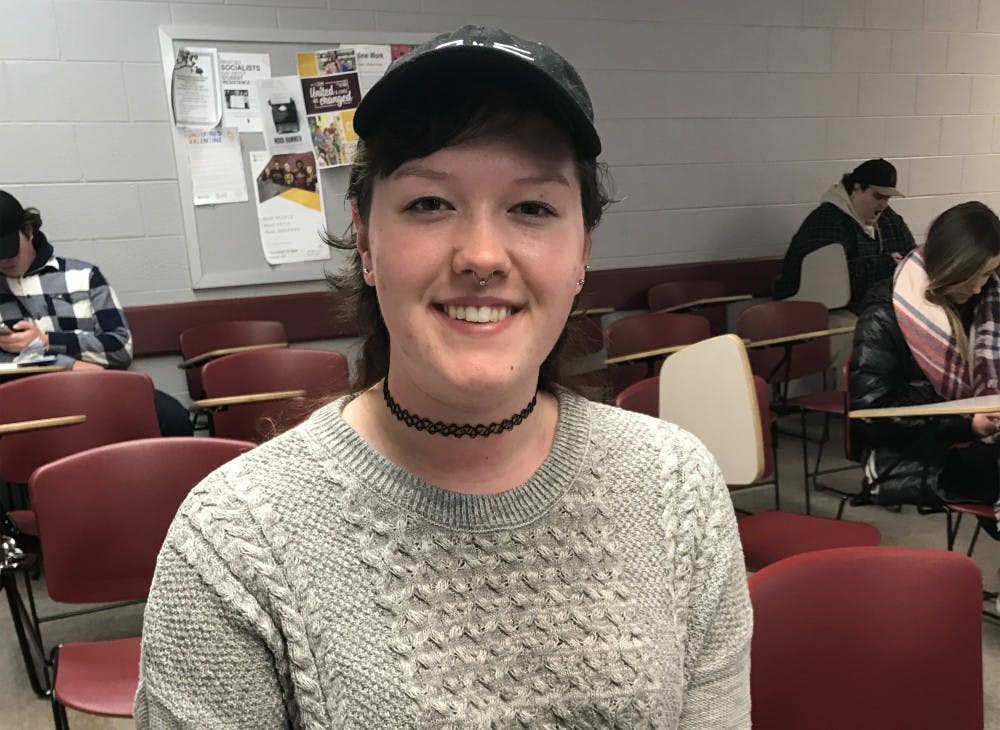Student discusses passion for mental health advocacy, journalism
Albion freshman Samantha Obarski attended her first journalism class during the Spring 2018 semester. She has always had a passion for educating others, she said, but wanted to use journalism rather than traditional teaching methods.
As her professor explained the syllabus to the students, those who sat behind Obarski couldn’t help but notice the tattoos on her arms. Resting right in front of them was a story many would be able to relate to.
One of the tattoos, a semicolon — a symbol of the fight against depression — is something many can recognize. Her left arm wore the tattoo like a badge of honor.
Central Michigan Life sat down with Obarski to discuss her tattoos, the role they play in her life and the reasons she aspires to pursue equality everywhere.
CM Life: What do your tattoos stand for and why did you decide to get them?
Obarski: On my right wrist, I have an equality sign because I’m part of the LGBT community. Equality is something I am very passionate about. I won’t treat anyone differently because they are straight, gay, white or black. It serves as a little reminder and a statement. I have a Gemini, Mercury and air symbol on my ankle because my mom and grandma were really into (astrology). Around those, I have the Lily of the Valley which is my grandma’s favorite flower. On my back, I have a quote from (the musical “Hamilton”) that reads “I’ll see you on the other side of the war” that has a Pokeball on it. That was for my friend who passed away in February.
Do you think depression and anxiety affect a lot of college students? What do you think causes that?
Definitely. I think a lot of it comes from stress. For me, the depression kicks in when I feel like I haven’t reached my full potential. Whenever I worry about life and my direction, as well as deal with issues back home, it brings on a lot of anxiety and depression. Moving away and not being at home can also cause a huge shift in mental health.
What do you plan on studying at CMU?
I wanted to (go into the field of) journalism since my freshman year of high school. I think that is because I love to write and I love storytelling. I also want to bring awareness to mental illness because of how much it has impacted me as an individual. I want to write about news concerning those situations as well as provide statistics to people.
I plan on minoring in American Sign Language because I’ve been interested in that since I was very young. My mother taught me the whole alphabet. When I was sick with strep throat, I even taught her the signs for water and juice. We really connected over that experience, so sign language is a huge part of my life. I’ve never encountered deaf culture myself, but I have an interest where a lot of people don’t. It’s good to try and understand it from the outside and try to learn as much as you can.
Are you passionate about all aspects of equality, or would your focus concerning journalism be more on mental health education because of your personal experiences?
It is more personal with me because of the LGBT community and my mental health challenges. If I could reach out and get correct information rather than opinion, I would definitely create a voice for others who are a minority in their communities.
Do you feel there are resources on campus that could help you accomplish that in the future?
Definitely. My multicultural advisor lives right next to me. Mia (McKnight) is great — she’s done a lot of things to help educate the community through events. I want to go to them, and that makes me proud. There are also clubs on campus that will help educate you on different subjects, and you can learn about anything you choose.
What changes would you make to the university, if any?
That’s a tough one. I can’t think of anything off the top of my head. The school has treated me right so far. I’ve been able to go to the resources I needed, because of mental health. I know if intervention is needed, they never over-step a boundary. With Sexual Aggression Peer Advocates, for example, if you make a report it is completely confidential. That is great, and a reason I want to be a part of it. If there is ever trouble with alcohol or drugs, the school steps in but never over-steps the boundary. They really only aim to protect you and the other students on campus.
Do you feel like your parents prepared you well for college? Or that your high school prepared you better?
My parents were definitely the ones who prepared me. My high school didn’t do anything. They taught writing styles that I don’t use in my classes. They also told me what to expect from professors, but were wrong about most of it. The only thing high school did was prepare me for deadlines.
My parents have always encouraged me to take time to myself when I need it, and to go to class often in order to understand the material being taught. My parents have also encouraged me to work, which allowed me to work with people of different race, gender and sexuality.






